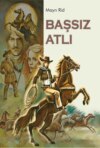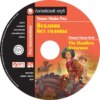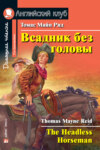Kitabı oku: «The Tiger Hunter», sayfa 11
Chapter Twenty Seven.
Duty versus Love
The last beams of the sun were gilding the summit of the ridge that bounded the plain of Las Palmas, when Don Rafael Tres-Villas crossed it on his way to the hacienda Del Valle. To recover the time he had lost, he pressed his horse to his utmost speed, and descended the slope on the opposite side at a gallop. As the brave steed dashed onward, a hoarse snorting sound was heard to issue from his nostrils, caused by the singular operation which the arriero had performed upon him.
On reaching the level of the valley in which stood the hacienda Del Valle, the horseman drew bridle and listened, he was sufficiently near the house to have heard any unusual commotion that might be there going on. He fully expected to have distinguished the shouts of men engaged in fight, or the tumultuous murmur of a siege.
No sound, however, reached his ear – not a murmur. Silence ominous and profound reigned throughout the valley.
With clouded brow, and heart anxiously beating, the officer continued on his course. He had unbuckled his carbine from the saddle, and carried the piece in his hand ready for use.
The silence continued. Not a cry awoke the solitude – not the flash of a fusil lit up the darkness of the twilight. The sleep of death seemed to be upon everything.
As already stated, Don Rafael had not visited the hacienda of Del Valle since he left it when only a child: he therefore knew nothing of the way that led to it beyond the directions he had received from his late host.
He was beginning to think he had gone astray, when a long wide avenue opened before him. This was bordered on each side by a row of tall trees, of the species taxodium disticha– the cypress of America. He had been told of this avenue, and that at its extremity stood the hacienda he was in search of. The description was minute: he could not be mistaken.
Heading his steed into the avenue, he spurred forward beneath the sombre shadow of the trees. In a rapid gallop he traversed the level road, and had arrived nearly at its further extremity, when all at once the walls of the hacienda came in view directly in front of him – a dark mass of building, that filled up the whole space between the two rows of trees.
The main entrance in the centre appeared to be only half closed, one wing of the massive gate standing slightly ajar. But no one came forth to welcome him! Not a sound issued from the building. All was silent as the tomb!
Still pressing forward, he advanced towards the entrance – determined to ride in through the open gateway; but, just at that moment, his steed made a violent bound, and shied to one side.
In the obscurity of the twilight, or rather from the confusion of his senses, Don Rafael had not observed the object which had frightened his horse. It was a dead body lying upon the ground in front of the gateway. More horrible still, it was a body wanting the head!
At this frightful spectacle a cry broke from the lips of the officer – a cry of fearful import. Rage, despair, all the furious passions that may wring the heart of man, were expressed in that cry – to which echo was the only answer. He had arrived too late. All was over. The body was that of his father!
He needed not to alight and examine it, in order to be convinced of this terrible fact. On a level with his horse’s head an object appeared hanging against one of the leaves of the great door. It was a head – the head that had belonged to the corpse. It was hanging from the latch, suspended by the hair.
Despite the repugnance of his horse to advance, Don Rafael drove the spur into his flank; and forced him forward until he was himself near enough to examine the fearful object. With flashing eyes and swelling veins, he gazed upon the gory face. The features were not so much disfigured, as to hinder him from identifying them. They were the features of his father!
The truth was clear. The Spaniard had been the victim of the insurgents, who had respected neither his liberal political sentiments, nor his inoffensive old age. The authors of the crime had even boasted of it. On the gate below were written two names, Arroyo—Antonio Valdez.
The officer read them aloud, but with a choking utterance.
For a moment his head fell pensively forward upon his breast. Then on a sudden he raised it again – as if in obedience to a secret resolve – saying as he did so, in a voice husky with emotion —
“Where shall I find the fiends? Where? No matter! – find them I shall. Night or day, no rest for me – no rest for them, till I have hung both their heads in the place of this one!”
“How now,” he continued after a pause, “how can I combat in a cause like this? Can a son fight under the same flag with the assassins of his father? Never!”
“For Spain, then!” he cried out, after another short moment of silence. “For Spain shall my sword be drawn!” And raising his voice into a louder tone, he pronounced with furious emphasis —
“Viva Espana! Mueran a los bandidos!” (Spain for ever! Death to the brigands!)
Saying this, the dragoon dismounted from his horse, and knelt reverentially in front of that ghastly image.
“Head of my venerable and beloved father!” said he, “I swear by your grey hairs, crimsoned with your own blood, to use every effort in my power, by sword and by fire, to nip in the bud this accursed insurrection – one of whose first acts has been to rob you of your innocent life. May God give me strength to fulfil my vow!”
At that moment a voice from within seemed to whisper in his ear, repeating the words of his mistress: —
“May all those who raise an arm in favour of Spain be branded with infamy and disgrace! May they find neither a roof to shelter them, nor a woman to smile upon them! May the contempt of those they love be the reward of every traitor to his country!”
Almost the instant after, another voice replied – “Do your duty, no matter what may be the result.” In presence of the mutilated remains of his father, the son hearkened only to the latter.
The moon had been long up before Don Rafael finished the melancholy task of digging a grave. In this he respectfully placed the headless corpse, and laid the head beside it in its proper position. Then, drawing from his bosom the long plait of Gertrudis’ hair, and taking from his shoulders the embroidered sun-scarf, with like respectful manner, he deposited these two love-tokens alongside the honoured remains of his father.
Convulsed with grief, he threw in the earth, burying in one grave the dearest souvenirs of his life.
It was not without difficulty that he could withdraw himself from a spot thus doubly consecrated by filial piety and love; and for a long while he stood sorrowing over the grave.
In fine, new thoughts coursing through his bosom aroused him to action; and, leaping into his saddle, he spurred his steed into a gallop, taking the road that conducted to the capital of Oajaca.
Chapter Twenty Eight.
The Illustrious Morelos
Little more than twelve months after its first breaking out – that is, about the close of the year 1811 – the Mexican revolution might have been compared to one of those great fires of the American prairies, whose destructive range has been checked by the hand of man. In vain the flames jet out on all sides, seeking fresh element. A wide space has been cleared around them. Soon the crackling of the large trees, and the hiss of the burning grass, cease to be heard; and the whole plain becomes enveloped under a cloud of smoke rising upward from the blackened ashes.
Such was the fate of the insurrection stirred up by the priest Hidalgo. From the little hamlet of Delores it had spread like fire over all the vice-kingdom of New Spain; but very soon the leaders were almost to a man made captives and shot – the venerable Hidalgo himself undergoing the same sad fate. A remnant of the insurgents, pressed on all sides by the royalist troops under General Calleja, had taken refuge in the little town of Zitacuaro, where they were commanded by the Mexican general, Don Ignacio Rayon. There they had established a junta, independent of the government; and continued to launch forth their proclamations, powerless as the glow of the prairie fire after its flames have been extinguished.
When such a fire, however, has been the work of men – when kindled by man’s will and for man’s purpose – and not the result of accident or spontaneity, then, indeed, the flames may be expected to burst forth anew at some other point of the prairie or the forest.
Just so was it with the Mexican revolution. Another champion of independence, of origin even more obscure than his predecessors – if that were possible – soon appeared upon the arena which they had quitted, and with an éclat likely to eclipse any of those who had preceded him.
This was the curate of Caracuaro, he whom historians designate as “El insigne Morelos” (the illustrious Morelos). The Mexican writers do not state in what year Morelos was born. Judging from the portraits I have seen of him, and comparing the different dates that have been assigned to his birth, he should have been about thirty-eight or forty years old, at the commencement of his career as a revolutionary leader. His native place was Talmejo, a small hamlet near the town of Apatzingam, in the state of Valladolid – now called Morelia, after the most illustrious of its sons. The only patrimony of the future heir of the Mexican independence was a small recua of pack-mules, left him by his father, who was a muleteer.
For a long time the son himself followed this humble and laborious calling; when, for some reason or other, the idea came into his head to enter holy orders. History does not say what was his motive for this resolution; but certain it is that Morelos proceeded to carry it out with that determined perseverance which was an essential trait in his character.
Having sold off his mules, be consecrated his whole time to acquire those branches of education, rigorously indispensable to the attainment of his purpose – that is to say, the study of Latin and theology. The college of Valladolid was the scene of his student life.
Having gone through the required course, orders were conferred upon him; but Valladolid offering to him no prospect of advancement, he retired to the little pueblo of Uruapam, where for a time he subsisted upon the scanty means supplied by giving lessons in Latin.
About this time the curacy of Caracuaro became vacant. Caracuaro is a village as unhealthy as poor, where no one could be supposed to reside from choice; and yet Morelos, lacking powerful friends, had great difficulty in getting appointed to the living.
In this miserable place had he resided in a state of obscure poverty, up to that hour, when, accidentally introduced to the reader, at the hacienda Las Palmas. Under the pretence of visiting the Bishop of Oajaca, but in reality for the purpose of fomenting the insurrection, Morelos had travelled through the province of that name; and at the time of his visit to Las Palmas, he was on his way to offer his services to Hidalgo, as chaplain of the insurgent army. The result of that application was, that instead of a chaplaincy to his army, Hidalgo bestowed upon the cura of Caracuaro, a commission to capture the fortified seaport of Acapulco. It was in reality rather as a jest, and to disembarrass himself of the importunities of Morelos, that Hidalgo bestowed this singular and important commission. How much Morelos merited the honour will appear in the sequel.
Chapter Twenty Nine.
A Course of Study Interrupted
In the early part of January, 1812 – about fifteen months after the scenes detailed as occurring near the hacienda Las Palmas – two men might have been seen face to face – one seated behind a rude deal table covered with charts and letters – the other standing in front, hat in hand.
This tableau was within a tent – the least ragged and largest, among a number of others that formed an encampment on the banks of the river Sabana, at a short distance from the port of Acapulco.
The person seated wore upon his head a checked cotton kerchief while his shoulders were covered with a jaqueta of white linen. It would have been difficult for any one not knowing him, to recognise in this plainly-dressed individual the commander-in-chief of the insurgent army encamped around, and still more difficult perhaps to have believed that he was the ci-devant “cura” of Caracuaro, Don José Maria Morelos y Pavon. And yet it was he.
Yes, the humble curate had raised the standard of independence in the southern provinces; had long been carrying it with success; and at this moment he was commander-in-chief of the insurgent forces besieging Acapulco – that very town he had been ironically empowered to take.
But notwithstanding the eccentric changes which civil war produces in the situations of men, the reader cannot be otherwise than greatly astonished when told, that the gentleman who stood in front of Morelos, encased in the somewhat elegant uniform of a lieutenant of cavalry, was the ci-devant student of theology – Don Cornelio Lantejas.
By what magical interference had the timid student of theology been transformed into an officer of dragoons – in the army of the insurgents, too, towards whose cause he had shown himself but indifferently affected?
To explain this unexpected metamorphosis, it will be necessary to enter into some details, continuing the history of the student from the time when we left him on a fevered couch in the hacienda of Las Palmas, till that hour when we find him in the marquee of the insurgent general.
It may be stated, in advance, however, that the extraordinary transformation which we have noticed, was entirely owing to a new act of parsimonious economy upon the part of Don Cornelio’s father, conducting him into a series of perilous mishaps and desperate dangers, to which his adventure with the jaguars and rattlesnakes, while suspended between the two tamarinds, was nothing more, according to the simile of Sancho Panza, than “tortus y pan pintado” (couleur de rose). To proceed, then, with the promised details.
On recovering from his temporary illness, the student travelled on to the dwelling of his uncle. He had been mounted in a more becoming manner, on a fine young horse, which Don Mariano – who owned some thousands of the like – had presented to him.
Having sounded the dispositions of the uncle, according to instructions, he made all haste in returning to his father’s house; which he reached in less than half the time he had employed upon his previous journey. Too soon, perhaps; for, had he been delayed, as before, two months upon the route, he might have escaped the series of frightful perils through which he was afterwards compelled to pass.
Before setting out on his mission to the bachelor uncle, he had finished his preliminary studies for the ecclesiastical calling; and it only remained for him to return to the college, and present his thesis before the faculty of examiners, to take out his orders. For this purpose it was necessary he should repair to Valladolid, where the university was. To make the journey, his father now provided him with an old she-mule of a most unamiable disposition, which he had obtained in exchange for the young horse – the gift of Don Mariano – with a goodly number of dollars in “boot.”
Thus mounted, the student started on his new journey – carrying with him the paternal blessing, and a long chapter of instructions, as to how he should manage his mule, and keep himself clear of all meddling with insurrectionary matters.
After journeying for two days along the route to Valladolid, he had arrived within sight of the straggling huts that compose the little pueblita of Caracuaro, when three horsemen appeared upon the road in front, and riding towards him.
The student was at the moment occupied in passing through his mind the rudiments of his theological education – which he had gained from a crowd of books; and which, with some uneasiness, he found had been well nigh driven out of his head by his late adventures in the South.
Just at that moment, when he was paying not the slightest attention to his mule, the skittish animal, frightened by the approach of the horsemen, threw up her hind quarters, and pitched her rider upon the road. As the latter fell, his head came in contact with a large stone, and with such violence as to deprive him of consciousness.
On coming to his senses again, he found himself seated against the bank of the causeway, his head badly bruised, and above all without his mule. The animal, profiting by the opportunity when the three horsemen had alighted to look after her spilt rider, had headed about, and taken the back track at full gallop!
Of the three horsemen, one appeared to be the master, and the other two his attendants.
“My son!” said the first, addressing the student, “your situation, without being dangerous, is nevertheless sufficiently serious. You will stand in need of that which you cannot obtain in the poor village of Caracuaro, which is, moreover, nearly two leagues distant. The best thing you can do is to mount behind one of my attendants, and ride back with us to the hacienda of San Diego, which we shall reach in an hour. Your mule has taken that direction; and I shall have her caught for you by the vaqueros of the hacienda. You will need a day or two of repose, which you can there obtain. Afterwards you can resume your route. Where were you going?”
“To Valladolid,” replied Lantejas. “I was on my way to the University, to enter into holy orders.”
“Indeed! then we are of the same robe,” rejoined the horseman with a smile. “I myself am the unworthy curate of Caracuaro – Don José Maria Morelos – a name, I presume, you have never heard before.”
In truth the afterwards illustrious Morelos was at this time entirely unknown to fame, and of course Don Cornelio had never heard his name.
The student was no little astonished at the appearance of the man who had thus announced himself as the cura of Caracuaro. For one of the clerical calling his costume was altogether singular – to say nothing of its being rather shabby. A double-barrelled gun, with one barrel broken, hung from his saddle-bow, and an old rusty sabre in a common leathern scabbard dangled against his horse’s side.
The two domestics were still more plainly attired; and each carried in his hand a huge brass blunderbuss!
“And you, Señor padre?” inquired the student in turn. “Where are you going, may I ask?”
“I? Well,” replied the cura, smiling as he spoke, “just as I have told you – to the hacienda of San Diego. After that to Acapulco – to capture the town and citadel in obedience to an order I have received.”
Such were at this time the equipment and warlike resources of the general, whose name afterwards obtained such heroic renown!
His response caused the candidate for holy orders to open his eyes to the widest. He fancied that in the confusion of his head he had not clearly comprehended the meaning of the cura’s speech; and he preferred this fancy to the alternative of supposing that the worthy priest of Caracuaro was himself suffering from mental aberration.
“What! you an insurgent?” inquired Lantejas, not without some apprehension.
“Very true. I am, and have been for a long time.”
As neither upon the head of the cura, nor yet of his two servants, there appeared those diabolical ornaments which had been promised them by the Lord Bishop of Oajaca, Don Cornelio began to think that perhaps all insurgents were not delivered over to the devil; and, as there was no alternative, he accepted the offer made to him, and mounted behind one of the attendants. He had made up his mind, however, not to accompany the curate of Caracuaro further than the hacienda of San Diego, and to make as short a stay as possible in such suspicious company. But he had scarcely completed this satisfactory arrangement with his conscience, when the burning rays of the sun shining down upon his head, caused a ferment in his brain of so strange a character – that not only did the idea of this insurrection, excited by priests, appear right and natural, but he commenced chanting at the top of his voice a sort of improvised war song, in which the King of Spain was mentioned in no very eulogistic terms!
From that time, till his arrival at the hacienda of San Diego, the student was altogether unconscious of what passed – and for several days after, during which he remained under the influence of a burning fever. He had only a vague remembrance of ugly dreams, in which he appeared constantly surrounded by armed men, and as if he was tossing about on a stormy sea!
At length his consciousness returned, and on looking around he was astonished to find himself in a small and poorly furnished chamber. He now remembered his tumble from the mule, and his encounter with the cura of Caracuaro. Finally, feeling himself strong enough to rise from his couch, he got up, and staggered towards the window – for the purpose of ascertaining the nature of a noisy tumult that was heard outside.
The courtyard under the window was filled with armed men – some afoot, others on horseback. Lances with gay pennons, sabres, guns, and other weapons were seen on all sides, glancing under the sunbeams. The horses were rearing and neighing – the men talking loudly – in short, the scene resembled the temporary halt of a corps d’armée.
His weakness soon compelled the invalid to return to his couch, where he lay awaiting impatiently – the more so that he was half-famished with hunger – the coming of some one who could give him an explanation of the strange circumstances by which he was surrounded.
Shortly after, a man entered the chamber, whom the student recognised as one of the attendants of the cura of Caracuaro. This man had come, on the part of his master, to inquire, the state of the invalid’s health.
“Where am I, friend? tell me that,” said Lantejas, after having answered the inquiries of the servant.
“At the hacienda of San Luis.”
The student summoned all his recollections; but these only carried him as far as the hacienda of San Diego.
“You must be mistaken?” said he. “It is the hacienda of San Diego, is it not?”
“Oh, no,” replied the domestic. “We left San Diego yesterday; we were no longer safe there. What folly of you, señor, to act as you did! No matter how good a patriot one may be, it’s not necessary to proclaim it from the housetops.”
“I do not comprehend you, my good friend,” said Lantejas. “Perhaps it is the fever that is still troubling my head.”
“What I have said is clear enough,” rejoined the domestic. “We were obliged to quit San Diego, where the royalist troops would have arrested us – on account of the loud declaration of his political opinions made by a certain Don Cornelio Lantejas.”
“Cornelio Lantejas!” cried the student, in a tone of anguish, “why that’s myself!”
“Por Dios! I well know that. Your honour took good care everybody should know your name: since out of the window of the hacienda you shouted with all your voice – proclaiming my master Generalissimo of all the insurgent forces; and we had the greatest difficulty to hinder you from marching upon Madrid.”
“Madrid – in Spain?”
“Bah! two hundred leagues of sea was nothing to you to traverse. ‘It is I!’ you cried, ‘I, Cornelio Lantejas, who take upon me to strike down the tyrant!’ In fine, we were obliged to decamp, bringing you with us in a litter – for my master would not abandon so zealous a partisan, who had compromised himself, moreover, in the good cause. Well, we have arrived here at San Luis; where, thanks to a strong body of men who have joined us, you may have an opportunity of proclaiming your patriotism as loudly as you please. For yourself, it can do no further harm, since, no doubt, there is a price placed upon your head before this time.”
The student listened with horror, and completely stupefied, to this account of his actions.
“And now, cavallero,” continued the domestic, “my master, whom you were the first to proclaim Generalissimo, has not permitted you to go without your reward. He has appointed you an alferez, and named you to be his aide-de-camp. You will find your commission under the pillow.”
Saying this, the servant left the room, leaving the unhappy alferez crushed beneath the weight of the astounding disclosures he had made to him.










